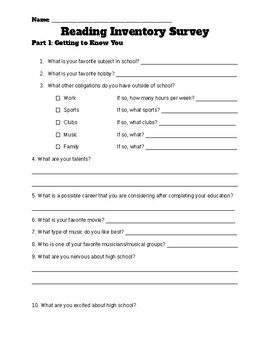

The teacher will write word for word what the student said in order to evaluate the student's comprehension.

If the passage was in the student's instructional level (90%-94%), then the teacher is to immediately ask the student what the story was about. The teacher will quickly score the student's reading performance. Have the student read the word list or passage orally While the student is reading, the teacher is to mark each word as correct, mispronounced,omitted, asking for help, self-correctioned, or as a repitition. For the reading passafe, the teacher needs to activate prior knowledge. How: Before beginning, the teacher is to prepare a word list or reading passage. Why: IRI's provide information about the students' reading stages and knoledge sources.Through miscue analysis, teachers are able to determine patternss in students' oral reading, which helps them to determine appropriate instruction for each student. When: This assessment can be conducted as needed. What: IRI's are individually administered diagnostic assessments designed to evaluate different aspects of a student's reading performance. The Lexile website offers a range of tools to find books' based on a student's reading level, improve her vocabulary and increase reading comprehension, such as "Find a Book" and the PowerV tool.Who: Informal Reading Inventory (IRI) passages range from pre-primer to high school level, but any passage may be used for any reading level. Students should also take the quiz provided at the end of each book.

Visualizing the story while reading may also help, to form visual memories to rely on during testing. Once you know your students’ interests, you’ve got a better chance of matching them up with texts they might like. These will help you see into their lives to help you determine what they might like to read. Encourage students to read each book slowly and carefully to aid comprehension. The beginning of the year is a great time to administer Interest Inventories with your readers. The best way for a student to improve her SRI score is to read Lexile books tailored to her current level, with the aim of progressing to a higher level. A minimum reading level of 1385L is considered to be college- and career-ready. For 11th- and 12th-graders, a score between 1185L and 1385L is proficient and a score of 1390L and above is advanced. For 10th-graders, a score of 1080L to 1260L is proficient and 1265L and above is advanced. Ninth-graders should ideally be between 1050L and 1260L to be considered proficient with scores of 12065L and above considered advanced. Eighth-graders who score 1190L and above are advanced. Students in the eighth grade should aim for scores between 1010L and 1185L to be proficient. For seventh-graders, a score of 970L to 1120L is proficient and 1125L and above is advanced. Sixth-grade students who score between 925L and 1070L are proficient readers, while those who score 1075L and above are advanced. Fifth-graders scoring 1015L or above are advanced. Proficient scores for fifth-grade students are between 830L and 1010L.

Scores of 520L to 820L are proficient for third-graders 825L and above is advanced.įourth-graders should score between 740L and 940L to be proficient, with advanced scores of 945L and above. Second-graders should ideally be between 420L and 650L to be considered proficient with scores of 655L and above considered advanced. Elementary SRI Scoresįor first-grade readers, a Lexile measure of 190L to 530L is proficient with 535L and above classified as advanced. It's worth noting that Scholastic advises against referring to a student's reading level as a score, in order to encourage achievement. Good SRI scores for each grade would fall within the categories of proficient and advanced. Typically, a school will split SRI scores for grades one through 11 into different categories, such as below basic, basic, proficient and advanced.


 0 kommentar(er)
0 kommentar(er)
